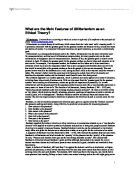Give an account of the main characteristics of Utilitarian theory.
Give an account of the main characteristics of Utilitarian theory. [35]
Utilitarianism is an ethical theory based upon the utility principle: the moral decision is the decision that brings, “the greatest happiness of the greatest number.” It is both teleological and consequentialist. Theories that are interested in ends are teleological, meaning the end does justify the means. You decide the rightness of an action by the end it produces. Stealing or lying is right if it leads to a better situation afterwards – the lie that saves a life; the theft that prevents a person from starving. Consequentialism means judging the rightness or wrongness of actions is based on our assessment of the consequences of our actions. This means we can only judge whether we have done good or bad after the event has taken place. In examining utilitarianism, a good place to start is the views of Bentham.
The English philosopher, Jeremy Bentham first formalised the ‘theory of utility’. Bentham argued that good equals the greatest amount of pleasure for the least amount of pain. Bentham’s form of utilitarianism is referred to as Act Utilitarianism. Each individual action is judged good (or bad) purely on the maximisation (or minimisation) of pleasure over pain. This is a quantitive theory as Bentham’s primary concern was with the amount of pleasure produced, not with rules or laws as they were of secondary importance. He used the ‘hedonic calculus’ to calculate the most pleasurable action. Using this system the following criteria are taken into account to decide what is right and what is wrong: the intensity, duration, certainty, remoteness, fecundity, purity and extent of the resulting happiness must be considered.









